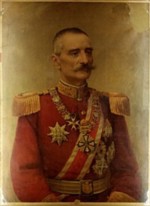Budva
After another 'interesting' drive, mostly along the Montenegro (Adriatic) coast, we made it to Budva.
The Old Town of Budva sits on a rocky peninsula that's been settled since Illyrian times (4th century BCE), before Greek colonisation of the Adriatic. The Greeks were followed by the Romans. Fortification was expanded during the Middle Ages and most of city walls and buildings we see today had their foundations during a period of Venetian rule.
Later changes occurred during Montenegro's membership of the Austro-Hungarian Empire.
The Citadel contains the ruins of the historic church of Santa Maria de Castello, after which the entire fortification was originally named.
The warren of Budva retains a certain stone-built charm - now re-built after the 1979 earthquake
Budva retains a certain stone-built charm and may once have been a warren of merchants and thieves. Today, its narrow re-cobbled, pedestrian-only, streets are lined with restaurants, cafes, pubs and shops. Thus, merchants and thieves have returned - now in up-market shops - with heavy mark-ups.
While Wendy was roaming the old town reliving her misspent youth (she had fun here - way back when) I found a pub that sells Guinness and waited. But I could only afford a half as they didn't accept cards and it was so expensive that it consumed all the Euros I had.
I found a pub that sells Guinness and waited
On her return Wendy seemed a bit disappointed not to have identified the haunts of her younger days. In 1979 the Old Town was almost destroyed by an earthquake. Repair and reconstruction took eight years, effectively erasing her past footsteps and the ancient crumbling walls and alleys of yesteryear. It was not her memory that had failed - it's a different place.
Later I discovered the local history museum and was happy - contemplating the knowledge, ingenuity, beliefs and misconceptions of our ancestors - for we are all related to those ancient Europeans.
In the little museum of Budva
In the museum we are invited to imagine the demise of the man wearing this helmet, as it was obviously inadequate protection against whatever it was that punched a hole in it. Several candidates are displayed in the same case. Yet, I think it's more likely that oxygen was the culprit.
Montenegro is firmly Christian, historically a bulwark against the neighbouring Ottoman Muslims,
and Budva has several historic churches
Leaving the old town for our good hotel in the modern part we strolled along the harbour front. Again, although our hotel was of international standard the economy of Montenegro is still struggling with very high unemployment.

